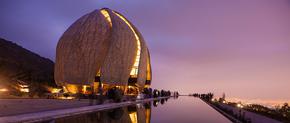The views expressed in our content reflect individual perspectives and do not represent the authoritative views of the Baha'i Faith.
The Prophets of God should be regarded as physicians whose task is to foster the well-being of the world and its peoples, that, through the spirit of oneness, they may heal the sickness of a divided humanity. – Baha’u’llah, Gleanings from the Writings of Baha’u’llah, p. 80.
Having diagnosed the illness—much as Baha’u’llah, the Founder of the Baha’i Faith, did in the nineteenth century and the international Baha’i institutions have done more recently—the Pope’s recent encyclical describes the fundamental transformation the world needs to solve its severe environmental and economic problems. It will not be sufficient, the Baha’i teachings and the Papal encyclical agree, to undertake a series of urgent and partial responses to the immediate problems of pollution, environmental decay and the depletion of natural resources:
There needs to be a distinctive way of looking at things, a way of thinking, policies, an educational programme, a lifestyle and a spirituality which together generate resistance to the assault of the technocratic paradigm. (§111)
If the present ecological crisis is one small sign of the ethical, cultural and spiritual crisis of modernity, we cannot presume to heal our relationship with nature and the environment without healing all fundamental human relationships…. Our relationship with the environment can never be isolated from our relationship with others and with God. (§119)
There can be no renewal of our relationship with nature without a renewal of humanity itself. (§118)
All of this shows the urgent need for us to move forward in a bold cultural revolution. Science and technology are not neutral; from the beginning to the end of a process, various intentions and possibilities are in play and can take on various shapes. Nobody is suggesting a return to the Stone Age, but we do need to slow down and look at reality in a different way, to appropriate the positive and sustainable progress which has been made, but also to recover the values and the great goals swept away by our unrestrained delusions of grandeur. (§114)
We cannot segregate the human heart from the environment outside us and say that once one of these is reformed everything will be improved. Man is organic with the world. His inner life moulds the environment and is itself also deeply affected by it. The one acts upon the other and every abiding change in the life of man is the result of these mutual reactions. – from a letter written on behalf of the Universal House of Justice, March, 1985.
The beginnings of that change are already apparent. “An authentic humanity, calling for a new synthesis, seems to dwell in the midst of our technological culture, almost unnoticed” (§112). This theme has also been developed in Baha’i International Community statements at the United Nations, such as “Rethinking Prosperity: Forging Alternatives to a Culture of Consumerism” (2010)
The Pope’s encyclical, in chapter 4, asks for an integral ecology, one that clearly respects its human and social dimensions:
Ecology studies the relationship between living organisms and the environment in which they develop. This necessarily entails reflection and debate about the conditions required for the life and survival of society, and the honesty needed to question certain models of development, production and consumption. It cannot be emphasized enough how everything is interconnected. (§138)
Nature cannot be regarded as something separate from ourselves or as a mere setting in which we live. We are part of nature, included in it and thus in constant interaction with it…. It is essential to seek comprehensive solutions which consider the interactions within natural systems themselves and with social systems. We are not faced with two separate crises, one environmental and the other social, but rather one complex crisis which is both social and environmental. Strategies for a solution demand an integrated approach to combating poverty, restoring dignity to the excluded, and at the same time protecting nature. (§139)
“We urgently need a humanism,” the Pope says, “capable of bringing together the different fields of knowledge, including economics, in the service of a more integral and integrating vision” (§141). “Human ecology also implies another profound reality: the relationship between human life and the moral law, which is inscribed in our nature and is necessary for the creation of a more dignified environment” (§155).
It is heartwarming to see the Pope develop themes to which many of us have devoted our lives, and that so clearly reflect the Baha’i approach:
All must become united and agreed: All are drops of one river, the waters of one sea, the breezes of one garden, the streams flowing from one fountain, the birds soaring from one apex, the hyacinths adorning one park intoxicated with one wine, and their hearts ravished by one melody. – Abdu’l-Baha, Star of the West, Volume 10, p. 173.
In his encyclical, the Pope also acknowledges the need for approaches that reach to the local community level and that make science more accessible. Ecology calls for greater attention to local cultures when studying environmental problems, favoring a dialogue between scientific-technical language and the language of the people. Culture is more than simply what we have inherited from the past; it is also, and above all, a living, dynamic and participatory present reality, which cannot be excluded as we rethink the relationship between human beings and the environment. This includes the important contribution of indigenous cultures, and the need for more participation in urban planning.

















Comments
Sign in or create an account
Continue with Facebookor